Feminism and Militarization: Implementing Women Peace and Secuirty
The recent Israeli bombing of the Gaza Strip continues to devastate and kill civilians living under occupation and the Israeli blockade. WILPF US's statement this week condemned the violence of all sides stating, “We deplore the use of violence by any party, but we are especially concerned about the safety of civilians in Gaza, and their desperation amidst heavy bombings on their buildings, their homes and their children, in one of the most crowded places in the world.”
The violence being perpetrated as part of military oppression in Gaza highlights the continual supremacy of masculinized, militarized approaches to ‘security', which have consistently failed to deliver peace. It is a stark reminder that we must continuously adopt a feminist critique of the situation in Palestine.
This month also there has seen a severe escalation in violence in Eastern DR Congo with tens of thousands of persons displaced, fleeing an escalation of conflict which has been defined by extreme forms of violence perpetrated by armed groups, who are explicitly targeting civilian populations. We send our solidarity to all affected and WILPF member in Congo at this time.
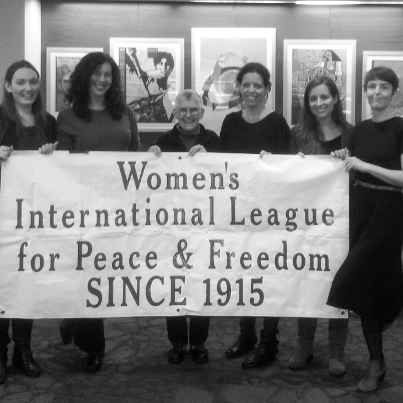 To highlight the causes and consequences of, militarization, WILPF/PeaceWomen hosted renowned feminist scholar Cynthia Enloe at two events with our partners in New York and Princeton. Cynthia challenged participants to reflect on their own feminist analysis. Cynthia powerfully discussed and highlighted the huge gaps that remain-- particularly in the Conflict Prevention pillar of the WPS agenda – how we disarm, how we defund militaries, shift power relations, prevent violence, and prevent war. Cynthia's work continues to provoke and question, demanding we engage our 'feminist curiosity' when asking questions about institutional cultures that preference violence over discourse, and militarized assumptions that dominate how "security" is defined. Thank you Cynthia for your work, which consistently challenges and reinvigorates our thinking about how to advance peace, equality and feminism! Read more about the event.
To highlight the causes and consequences of, militarization, WILPF/PeaceWomen hosted renowned feminist scholar Cynthia Enloe at two events with our partners in New York and Princeton. Cynthia challenged participants to reflect on their own feminist analysis. Cynthia powerfully discussed and highlighted the huge gaps that remain-- particularly in the Conflict Prevention pillar of the WPS agenda – how we disarm, how we defund militaries, shift power relations, prevent violence, and prevent war. Cynthia's work continues to provoke and question, demanding we engage our 'feminist curiosity' when asking questions about institutional cultures that preference violence over discourse, and militarized assumptions that dominate how "security" is defined. Thank you Cynthia for your work, which consistently challenges and reinvigorates our thinking about how to advance peace, equality and feminism! Read more about the event.
This nexus between militarized domination and exclusion of women's rights is the focus of WILPF's official CSW statement for next year (CSW 57 in March 2013) which we submitted last week.
Since our last Enews, PeaceWomen also co-hosted an important event with Katherine Ronderos, President of WILPF section in Colombia and Adalgiza Charria, a prominent women's rights activist in Columbia. The women presented how they are now organizing and advocating for women's full and equal participation in the on-going peace talks, and the inclusion of women's rights in the process in the highly militarized and patriarchal society of Colombia. They are using Security Council resolution 1325 as a tool to call for the prioritization– and political prioritization - of gender equality as central to achieving sustainable peace. Read More about the event on Colombia.
As a reminder the Security Council's annual open debate on Women, Peace and Security has been postponed until Friday November 30th, 2012 under the Presidency of India. The Council did adopt a Presidential Statement on October 31st, 2012. The rescheduling was due to Hurricane Sandy and closure of UN.
In this edition's articles we look at the recent NGOWG annual report on the implementation on Women Peace and Security at the UN Security Council. We also highlight the PeaceWomen co-sponsored event on 1325 and women's exclusion from the Colombian peace process, the work of the Special Court for Sierra Leone, and the 16 Days campaign, which is just around the corner. In news, events and initiatives we feature Women Peace and Security related material, which includes the exciting news of Ghana launching its first National Action Plan on 1325 and the Pacific Islands developing a Regional Action Plan.
(In the picture: Maria, Ariel, Cynthia Enloe, Petra, Amanda, Sharna - PeaceWomen team and WILPFer after the Cynthia Enloe Event)
Security Council Monitor
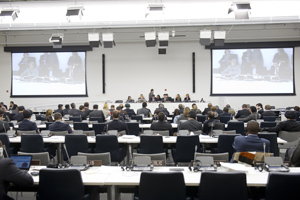 Due to Hurricane Sandy, on October 31st, 2012 the Women Peace and Security Presidential Statement was adopted during a technical meeting, which did not provide opportunity for statements. The Women Peace and Security open debate will resume on November 30th under the Presidency of India.
Due to Hurricane Sandy, on October 31st, 2012 the Women Peace and Security Presidential Statement was adopted during a technical meeting, which did not provide opportunity for statements. The Women Peace and Security open debate will resume on November 30th under the Presidency of India.
For November 2012, the Security Council will discuss several countries that are currently monitored by PeaceWomen. We anticipate that resolutions will be adopted on Sudan, the Democratic Republic of Congo, Bosnia and Herzegovina, and Somalia.
As usual we will be monitoring the regular activities of the Security Council and posting gender analysis on the Security Council Monitor section of the website.
Image: Security Council meet at temporary North Lawn building
Mapping Women, Peace and Security in the UN Security Council
The NGO Working Group (NGOWG) on Women Peace and Security (of which PeaceWomen/WILPF is an active member) produces 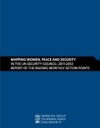 Monthly Action Points (MAP), which addresses pertinent issues on the Council's agenda, drawing on information provided by NGOWG members in the field about women's key concerns, then providing recommendations to the Security Council.
Monthly Action Points (MAP), which addresses pertinent issues on the Council's agenda, drawing on information provided by NGOWG members in the field about women's key concerns, then providing recommendations to the Security Council.
The MAP annual report serves as a shadow report to the “Annual Report of the Security Council” analyzing the Council's work for effectiveness through the lens of Women, Peace and Security, and providing recommendations and guidance for improvement.
Examining situations of political change, conflict and violence the 2011/2012 report “Mapping Women, Peace and Security in the UN Security Council,” examines the 12 month period from 1 August 2011 through 31 July 2012 and finds that though there are areas of significant normative progress, the necessary and consistent action by the international community remains acutely insufficient.
No Peace Without Justice
In early October, President of the Special Court for Sierra Leone, Justice Shireen Avis Fisher and Registrar, Binta Mansaray, traveled to New York to share the important work of the court with the UN, member states and civil society.
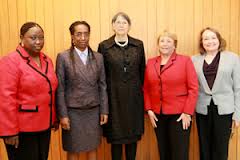 The Special Court for Sierra Leone is mandated to try those who bear the greatest responsibility for serious violations of international humanitarian law committed in Sierra Leone since 30 November 1996. The Special Court has set important precedents for gender justice in the international system, including the recognition of forced marriage as a crime against humanity, and Sexual and Gender Based Violence as a crime of terrorism.
The Special Court for Sierra Leone is mandated to try those who bear the greatest responsibility for serious violations of international humanitarian law committed in Sierra Leone since 30 November 1996. The Special Court has set important precedents for gender justice in the international system, including the recognition of forced marriage as a crime against humanity, and Sexual and Gender Based Violence as a crime of terrorism.
The court has also set new standards for gender sensitive approaches to participation in the justice process and witness protection for women and girl survivors of the conflict. Although the court has only tried a small number of those deemed to be most responsible, the court has prioritized localization of justice to ensure the courts decisions and actions do not remain remote to the people of Sierra Leone.
Traveling with a small generator, media equipment and taped summaries of the trials, the Outreach program has taken the work of the court to the people, and incorporated their needs and expectations of Sierra Leonians into the courts work. This broad participatory approach has been one of the greatest achievements of the court, and essential step towards ending impunity and bringing sustainable peace.
Concluding a small panel discussion attended by New York based NGO's, Justice Shireen reminded us that "there can be no peace without justice", and that we can all play a role in sharing the achievements of the Special Court for Sierra Leone with our networks, peers and colleagues, so that it's achievements in gender justice will influence global justice systems, and contribute to ending impunity.
Where are the Women?
On Friday November 2nd PeaceWomen and Global Network of Women Peacebuilders hosted a panel discussion on 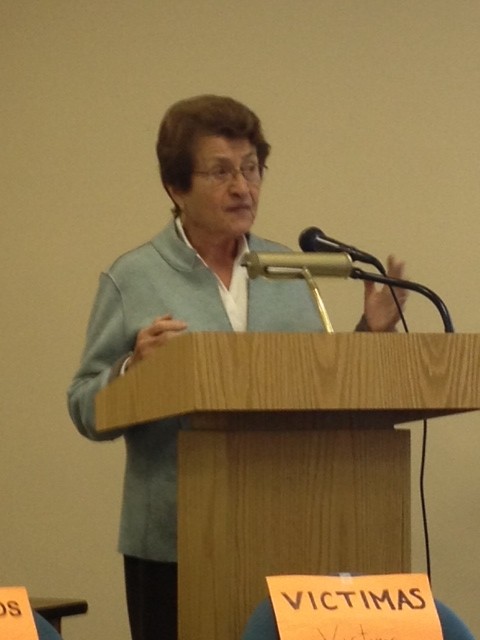 women's participation in the peace talks between the Colombian government and the FARC (Revolutionary Armed Forces of Colombia).
women's participation in the peace talks between the Colombian government and the FARC (Revolutionary Armed Forces of Colombia).
Cora Weiss described the disproportionate impact the conflict has had on women who are overrepresented among victims of sexualized violence and forced displacement. She highlighted the disappointing fact women are once again being sidelined from the peace table, despite the clear mandate of UNSCR 1325 to include women at all stages of peace processes. She highlighted the fact that women's organizations throughout Columbia have been at the forefront advocating for peaceful resolution to the conflict and defending human rights, yet their expertise continues to be overlooked.
Adalgiza Charria, urged the international community to help push for victims' issues to be heard and prioritized by all parties of the negotiations. Katherine Ronderos, spoke of women's efforts to support the calls of the UNSCR 1325, and highlighted the need for tools to increase the political participation of women at all levels, mechanisms to deal with the threats against women human rights defenders, and to end impunity for sexual violence.
While we celebrate the 12the anniversary of UNSCR 1325, and highlight the contributions of women's civil society, it is deeply disappointing that the mandate to include women at all stages of peace processes continues to be neglected. Women's inclusion is not an optional extra, or a luxury to be indulged after other more "important concerns" are addressed - it is central to the achievement of sustainable peace.
We stand in solidarity with the women of Columbia in their demands to be represented at the peace table, so that they may bring this expertise to bear, for the benefit of all Colombians.
Women and Militarization Before, During and After Wars
 On 14th November 2012, PeaceWomen in partnership with the Liechtenstein Institute on Self-Determination and Permanent Mission of Liechtenstein were pleased to host Professor Cynthia Enloe, research professor at Clark University (and WILPF member), as a part of a new lecture series on the Women, Peace and Security (WPS) agenda.
On 14th November 2012, PeaceWomen in partnership with the Liechtenstein Institute on Self-Determination and Permanent Mission of Liechtenstein were pleased to host Professor Cynthia Enloe, research professor at Clark University (and WILPF member), as a part of a new lecture series on the Women, Peace and Security (WPS) agenda.
Professor Cynthia Enloe is a pioneer in the field of feminist international relations. Her work has illuminated the exploitation of women, femininities and masculinities in political, globalization and militarization processes. From the factory floor to the lives of military wives – her work has been revealed how imperative it is to maintain a ‘feminist curiosity' and to take the lives of women seriously.
Professor Enloe spoke to the importance of assumptions, as they are the “things that go unsaid but motivate people”. She challenged participants to examine their own assumptions, and to reflect on how we may investigate, expose and challenge the assumptions of those we seek to influence in advocating for the implementation of WPS our every day practice. 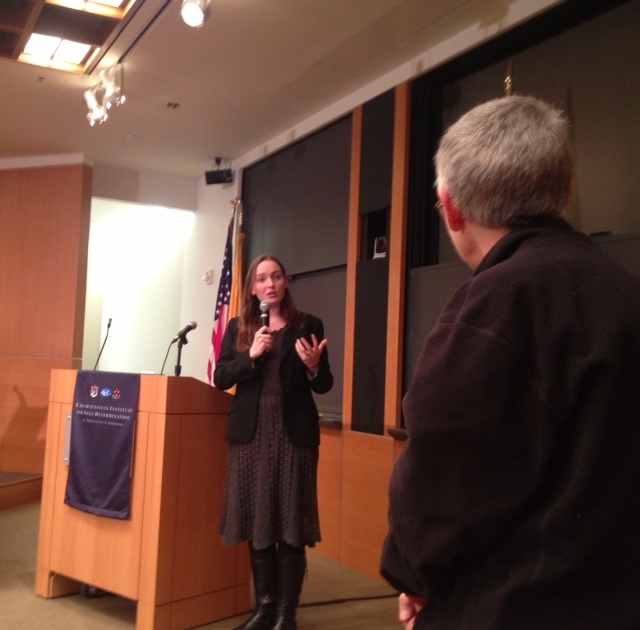
She emphasized that “security” and the making of insecurity/security is a process, one that is deeply gendered, and often hinged on women's silence about their own experience of insecurity.
Speaking to an audience of practitioners and experts from civil society, the UN and member states, her presentation challenged, provoked and invited us to reflect upon and develop our own practice. It was a fantastic opening to our new lecture series on the Women, Peace and Security (WPS) agenda, and we look forward to more engaging events over the coming months!
Read the full event summary here
16 Days of Activism Against Gender Violence
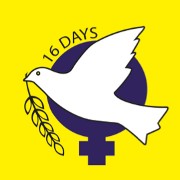 The 16 Days of Activism Against Gender Violence “From Peace in the Home to Peace in the World: Let's Challenge Militarism and End Violence Against Women!” is just around the corner!
The 16 Days of Activism Against Gender Violence “From Peace in the Home to Peace in the World: Let's Challenge Militarism and End Violence Against Women!” is just around the corner!
The connection between violence against women and militarization has been a core of WILPF's agenda for almost 100 years (see WILPF's ongoing campaign “You get what you pay for”), and 11 WILPF sections from around the world are planning actions for this years campaign.
As part of the campaign WILPF will be releasing 16 blogs – one for every day of the campaign- were you can follow each sections activities, and learn about their in-country work. You can follow our blogs at the WILPF International website.
We also encourage you to share your own actions with us, so that we can feature your activism on the PeaceWomen website.
Don't have any actions planned, but want to get involved? Here are the steps WILPF suggests to get you started:
Step 1: Review the 16 Days Campaign website and Take Action Kit
Step 2: Form a Project Team & Planning Committee
Step 3: Research SIPRI Data
Step 4: Read WILPF's “You Get What You Pay For”
Step 5: Start your own country or global analysis on Military spending & gender violence
Step 6: Report your findings to WILPF and the Center for Women's Global Leadership (16 Day Campaign)
Download the WILPF 16 Days of Activism Against Gender Violence Campaign Flyer
The campaign runs from November 25, International Day against Violence against Women, through December 10, International Human Rights Day – so there is still time to get on board.
We can no longer afford to ignore the connection between militarization and women's security – get involved and say no to militarization and violence against women!
